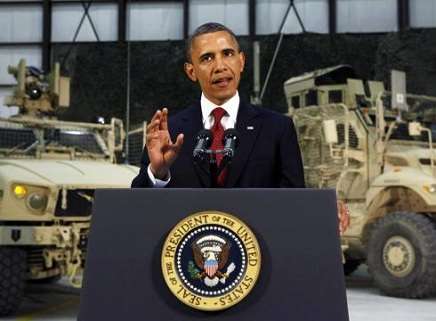Barack Obama's Not Ending the War in Afghanistan
This is looking like the war that never ends, it just goes on and on...

Barack Obama campaigned in 2008 on a promise to end the war in Iraq. That promise he tried his best to break by supporting a residual force of 10,000 U.S. troops past the 2011 withdrawal date agreed to by George W. Bush and Iraqi Prime Minister Nouri al-Maliki several years prior. That plan, in fact, was also endorsed by Mitt Romney; the Republican presidential nominee called the president out on this fact at the last debate, but Obama responded by outright lying, saying "what I would not have done is left 10,000 troops in Iraq that would tie us down" even though that was exactly what he tried to do. "That certainly would not help us in the Middle East," Obama said of the 10,000 troops both he and Romney wanted to remain in Iraq past the 2011 withdrawal.
The tentative withdrawal date in Afghanistan is 2014. Unlike the withdrawal date in Iraq, the Afghanistan date was negotiated not between the presidents of the U.S. and Afghanistan but among NATO leaders, making it much easier for the U.S. to wriggle out of. In fact, before NATO agreed to withdraw by 2014, the U.S. and Afghanistan worked out a deal to keep U.S. forces in Afghanistan for the next ten years. That truth was conveniently obscured during the campaign season but U.S. officials have made it a lot clearer the U.S. war in Afghanistan is not ending in 2014 since election day. The week after the election, one general told Congress at his confirmation hearing to take command in Kabul that the war in Afghanistan would certainly have to last past 2014.
And now the top man for NATO forces in Afghanistan, General John Allen, is providing a "preliminary assessment" to the Pentagon on just how many troops ought to remain in Afghanistan after 2014. One option being floated is that magical number of 10,000 troops, to remain, apparently, in order to continue to train and support Afghan forces and to conduct counterinsurgency operations. U.S. forces in Afghanistan have been doing that for the last decade. Despite a vaunted surge in 2009, U.S. forces continue to suffer from a lack of coherent direction or leadership in Afghanistan. The ultimate decision on how many troops will remain in Afghanistan past 2014 and what they will do, of course, theoretically rests with the president, one who believes he's ending the war in Afghanistan, or at least says so. Two thirds of Americans, meanwhile, want the war to end. Will empathy toward their preference be enough to placate?


Show Comments (52)